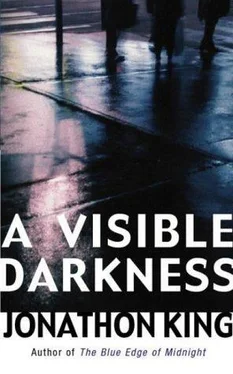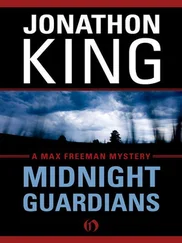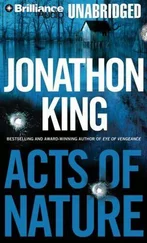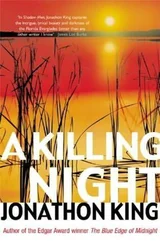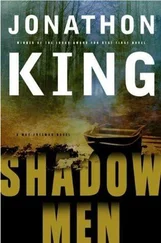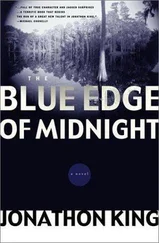Jonathon King - A Visible Darkness
Здесь есть возможность читать онлайн «Jonathon King - A Visible Darkness» весь текст электронной книги совершенно бесплатно (целиком полную версию без сокращений). В некоторых случаях можно слушать аудио, скачать через торрент в формате fb2 и присутствует краткое содержание. Жанр: Триллер, на английском языке. Описание произведения, (предисловие) а так же отзывы посетителей доступны на портале библиотеки ЛибКат.
- Название:A Visible Darkness
- Автор:
- Жанр:
- Год:неизвестен
- ISBN:нет данных
- Рейтинг книги:3 / 5. Голосов: 1
-
Избранное:Добавить в избранное
- Отзывы:
-
Ваша оценка:
- 60
- 1
- 2
- 3
- 4
- 5
A Visible Darkness: краткое содержание, описание и аннотация
Предлагаем к чтению аннотацию, описание, краткое содержание или предисловие (зависит от того, что написал сам автор книги «A Visible Darkness»). Если вы не нашли необходимую информацию о книге — напишите в комментариях, мы постараемся отыскать её.
A Visible Darkness — читать онлайн бесплатно полную книгу (весь текст) целиком
Ниже представлен текст книги, разбитый по страницам. Система сохранения места последней прочитанной страницы, позволяет с удобством читать онлайн бесплатно книгу «A Visible Darkness», без необходимости каждый раз заново искать на чём Вы остановились. Поставьте закладку, и сможете в любой момент перейти на страницу, на которой закончили чтение.
Интервал:
Закладка:
There was reverence in his voice when he told how Flagler then took his rail line to Miami when it was just a fishing town, and then took on the superhuman task of building the overseas rail line from island to island all the way to Key West.
Some of this history I knew. Billy had been my lending library, passing on books about Florida's past, Audubon guides when I stared dumbly at a species I didn't know and maps to give me a larger idea of where I was. He rarely gave tutorials. But this felt different. My friend was a lawyer, he was building a case.
"Flagler employed thousands of southern blacks, free men who left their birth homes in Georgia and Alabama to hack his trail down the coast. They were the ones who piled the sand and gravel for a roadbed and then laid the ties and rails to carry Flagler's class to the sunshine."
"But better work than trying to scratch out the sand where they had been," I offered.
"Agreed," said Billy. "They weren't forced and they weren't stupid. But Flagler was also a businessman. He knew that deadheading empty trains back north wasn't profitable. So he encouraged and often subsidized farmers to grow citrus and winter vegetables on the land west of his tracks."
"So he could fill the empty trains going back north, and make a buck selling oranges in the winter," I said.
"Exactly. And once the rails were down, many of the black workers stayed and went to the fields to harvest that fruit and those winter vegetables."
For generations those families would be the muscled backbone for a thriving agricultural industry. It was not, we both knew, unlike the working core of North Philadelphia's factories and machine shops that once built thriving neighborhoods there.
"By the 1940s, stable communities were set west of Flagler's tracks," Billy went on. "And entrepreneurial women started small businesses, stores and restaurants that created an internal economy."
Billy's command of the facts was always solid, his telling of the stories always eloquent, especially over the phone when he felt most comfortable. But deep into my fourth cup of coffee, I finally interrupted him.
"Wonderful history, Billy. And I appreciate your constant efforts to educate me. But your point is?"
He waited a few studied beats.
"The matriarchs, the ones who were forward-thinking and looked to guide and care for their family's future?" he said, hesitating, letting the leading question hang.
"Yes?"
"I think they are being killed."
I paddled for more than an hour, east and south toward the sea. The river water had turned a dull blue green and its banks changed from the low tangle of mangroves to sandy banks sprouting skinny pines. I was sweating heavily, but had perfected my strokes so that I could wipe the perspiration from my eyes with a swipe of my shoulder without breaking the rhythm. Since leaving the canopy the smell of brackish water had thickened and the east wind brought in the salt odor of the Atlantic. By the time I swung around the last bend and spotted the boat ramp at the ranger station, the morning sun was full, the dome of blue sky cloudless.
I sprinted the last 300 yards, digging deep and long, straining muscle and lungs until the blood pounded in my ears, and then I coasted into the graveled edge of land. I sat with my elbows on my knees and waited until my heart tripped down and my breathing eased before I stepped out into ankle-deep water. I pulled the boat up into a worn patch of shaded grass and pine needles and unloaded.
The dock was empty but for the new ranger's Boston Whaler tied up at one end. Further down the river I could see a single fisherman in a bass boat working the edges of an outcropping of pine root. I shouldered my gym bag and walked up to the washrooms and showered in hot water for the first time in weeks. I shaved and then dressed in canvas pants, a short sleeved polo shirt and better Docksides. When I came out I stopped just outside the doors and glanced over to the ranger's office. No one appeared, even though I knew the 24-hour shift man was on duty and had seen me arrive. As I walked back to my canoe and gathered the rest of my things, I could feel eyes on my back. I crossed the parking lot and opened the cab door to my midnight-blue pickup truck to let the heat escape and tossed my bag in. I went back and flipped the canoe under the shade tree, placed a black plastic bag of trash I'd brought from the shack in a nearby barrel and cut my eyes once to the windows of the office.
Several months ago innocent blood had been spilled on the river. An old and revered ranger and his young assistant were killed. Some of it had been on my hands. I believed it, and I could not blame others if they shared that belief. I climbed into my truck and pulled out of the parking lot, the white shell surface crunching and popping under my tires.
Twenty minutes later I was climbing the entrance ramp to I-95 and, as always, dreading the traffic and the stench of exhaust in the urban world. Billy had asked me to meet him in his office just south of downtown. I dutifully stayed in my proper lanes, cruising south at the acceptable ten miles an hour over the speed limit, and slipped off the packed interstate onto an equally busy avenue. In downtown West Palm Beach I maneuvered through the one-way streets to a commercial block of high-rises that carried the names of banks and financial institutions on the facades. The buildings were all done in the same sandstone texture with the same contemporary block design. It was like a cookie-cutter Levittown gone vertical.
When I got to Billy's building I took the side entrance to the parking garage and stopped at the booth.
"Visitors spots right there to the left," the attendant said after checking my name on a clipboard. He'd given me a pleasant enough smile in response when I'd given Billy's name, but like a trained street cop he'd also let his eyes roam my face and I could almost feel him reciting hair color, eyes, collared shirt and no tie. In my rearview I saw him taking down my tag number. It was a careful building.
I locked the truck and walked through a tiled passageway to the main lobby. There I ignored the scrutiny of the desk clerks and crossed to the bank of elevators, stepped in, and pushed 15. The entrance to Billy's suite was unmarked, just a double wood door of solid varnished oak. Inside the carpet was thick and simply patterned in a soft burgundy. There were several fine seventeenth- century English landscapes on the walls of the reception area that surrounded a large cherry wood desk. Behind a computer screen and a multi-button phone was Billy's secretary.
"Good morning, Mr. Freeman," she said, standing to reach over the desk to shake my hand. "A pleasure to see you again."
"It is always my pleasure, Allie."
"Thank you," she replied without a flutter. When Billy had first introduced me and told her where I lived and that I would have no mailing address, she'd seemed mildly amused. She was a third- generation Floridian, was creative and cultured and had only a cursory knowledge of the Everglades. The idea that a newcomer would live at its rough edge seemed a curiosity to her. The idea that the most dominating physical feature of an entire state could be ignored seemed to me an equal curiosity.
"Go right in, Mr. Freeman. He's waiting," she said. "I'll bring coffee."
Billy came around from behind his desk when I entered and smiled broadly. He was dressed impeccably in a starched, hand- tailored white shirt buttoned at the throat. His vest was brocaded in a swarm of subtle color. His suit pants were lightweight and charcoal, the matching coat was on a hanger. His shirt cuffs were rolled, carefully, twice.
"M-Max. Y-You are 1-looking well," he said in his standard greeting.
It had taken me some time to get used to Billy's stutter, and only part of the effort had been because of the incongruity with his appearance and obvious success. But the constant reminder was the way his speech pattern turned on and off. His is a tension stutterer. On the phone, from the other side of a wall, even through a darkened doorway opening, his voice is clear, smooth and flawless. Face-to-face, his words clatter and fall from his mouth. The distinction seems a joke or a deception at first. But I learned early to listen to the words themselves, and judged him only by what he said, not how.
Читать дальшеИнтервал:
Закладка:
Похожие книги на «A Visible Darkness»
Представляем Вашему вниманию похожие книги на «A Visible Darkness» списком для выбора. Мы отобрали схожую по названию и смыслу литературу в надежде предоставить читателям больше вариантов отыскать новые, интересные, ещё непрочитанные произведения.
Обсуждение, отзывы о книге «A Visible Darkness» и просто собственные мнения читателей. Оставьте ваши комментарии, напишите, что Вы думаете о произведении, его смысле или главных героях. Укажите что конкретно понравилось, а что нет, и почему Вы так считаете.
